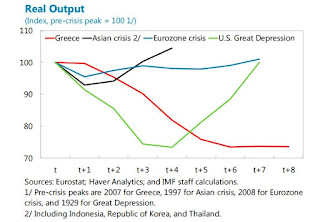There will be no public transport in Athens on Thursday due to a protest strike by the unions representing workers on the Metro, ISAP (Ilectriko) and Trams. The strike is in protest against the proposed use of stations and other STASY land and facilities for commercial purposes. The unions claim this "will reduce STASY’s revenues and threaten the “public and social character” of public transport." STASY is the company that operates Athen's fixed-track public transport system. It is difficult to justify a strike like this and also hard to see how it will negatively affect the revenues of STASY. As usual, no consideration is being shown for ordinary people who will struggle to get to work or not make it at all.
http://www.ekathimerini.com/216355/article/ekathimerini/news/no-metro-tram-or-isap-in-athens-on-thursday
13/02/2107
The chart in the previous post shows the depth and duration of Greece's recession compared to other recent economic crises. The article below gives a synopsis of the IMF report on the Greek crisis and it makes for very grim reading. There is an air of defeat about it and it offers no hope, under the present circumstances, of improvement any time soon. Taking the current sentiment among most people in Greece into consideration, this is probably a very accurate analysis of the current mood - hopelessness.
http://www.ekathimerini.com/216130/article/ekathimerini/business/greeces-sad-story-in-black-and-white
08/02/2017
The IMF has published its report on Greek debt sustainability and, putting it mildly, it disagrees with the EU in relation to this issue.
As can be seen from the chart, the recession in Greece has continued longer than other crises, including the Great Depression of 1929. The Eurozone crisis overall was not very deep, especially when compared to the Great Depression or the Greek crisis. It seems likely that the big players in the Eurozone, such as France and Germany used countries like Greece and Ireland to launder "illegal' state aid to their ailing banks, via bailout money to these countries. Greece and Ireland used the bailout money to pay of bank debt and bondholders and thus save the European banking system. The EU and IMF are now the main creditors for countries like Greece and the banks have been reimbursed, despite their reckless lending practices. Based on the duration of the crisis in Greece, it would seem that the 'not so hidden' agenda is to create the circumstances where Greece's position as a member of the single currency is untenable.
The following article gives a summary of the IMF report.
http://www.independent.ie/business/irish/eu-faces-new-crisis-over-explosive-greek-debts-warns-imf-35433290.html
05/02/2017
Yanis Varoufakis, the former finance minister of Greece, has suggested that Alexis Tsipras discontinue discussions with the Country's creditors and move to a parallel payment system that he designed. He also suggests that German finance minister Wolfgang Shauble, wants to make the situation so difficult for Greece that it will voluntarily leave the Euro.
